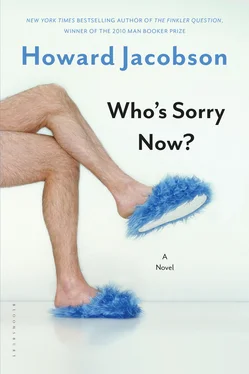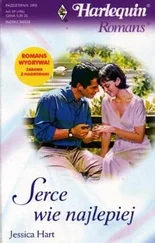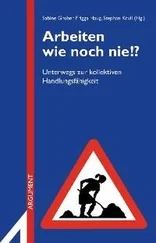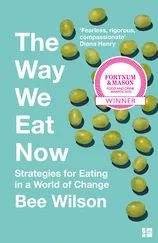‘Stop it, Marvin!’
He began to cry himself, the full waterworks she remembered so well from the platform at Paddington, and after that every station you could name. She knew what they were worth. She could price the downpour, tear by tear. Nothing was what they were worth. Not a farthing. But she was lonely and horrified by herself, to be feeling what she was feeling, to be at the mercy of all that old pestiferous stuff again — desire of so little consequence it made your stomach turn, but still, somehow, desire. ‘Move over,’ she said, ‘and let me in.’
He folded her in his arms, surprised, as he had always been, by how small she could make herself. ‘It’s all right,’ he said. ‘It’s OK.’
‘It isn’t OK,’ she said.
He knew what she meant by that. A dread clutched his heart. When women who had loved you lay in your arms and said it wasn’t OK it only ever meant one thing. It meant that they were in the grip of an uncontrollable longing for someone else. A melodramatist of sex, as are all dedicated adulterers and fornicators, Kreitman conceived such longing as a force so irrefutable and destructive that nothing could possibly survive it. Not duty, not home, not decency, not reason, not God, not him. The dread that clutched his heart was a foreboding of his own obliteration. No half measures for Kreitman, when it came to the gains and losses of sex. You won everything, you lost everything. What was marvellous was how alike those two extremes could be. Embracing his obliteration, shutting his ears to every sound except his lurching heartbeat, Kreitman felt desire for his would-be faithless wife race like poison through his body. ‘How bad is it?’ he whispered. ‘How much do you want to fuck him?’ At once, as though she were some washed-up shell creature, poked at by a callous boy, Hazel closed and went rigid in his arms. Kreitman knew what he had to do. He had to shut the fuck up. Not say another single fucking syllable. But he too was at the mercy of an ungovernable longing. ‘Tell me,’ he said. ‘Speak to me. You can imagine I’m him, if it will make you feel better. Call me Nyman. I am your husband’s enemy. Beg me to fuck you …’
And this time Hazel did hit him.
The following day, Kreitman sat in a metal chair — one of thirty or forty arranged in book-club formation around the Moriarty Room — and listened to the Merriweathers taking questions from their fans. The usual: where do you get your ideas, how do you find a publisher, how are you able to work together, do you try your stories (sorry, did you try your stories) on your own children, what would you like to be if you weren’t writers. Sour for all sorts of reasons, but at his sourest in the presence of book readers and their providers, for he had imagined such a life for himself once, touring the world discussing Francis Place and the glory that was once the English mind, Kreitman allowed his own mind to turn against his friends. What would you like to be if you weren’t writers? Excuse me — what the Merriweathers, Charlie and Charlie, did was not write. Writers wrote for adults, not for children. As for where they got their ideas — ha! The Merriweather books did not contain ideas. Kreitman did not know that for a fact. He hadn’t read, properly read , any of the Merriweather books. But he knew it as an intuition. He didn’t approve of children’s books. He had not read children’s books as a child himself and to the degree that he had been allowed a say in the matter he had not permitted his own children to read them. What was wrong with The Mill on the Floss? What was wrong with Jane Eyre? What was wrong with A Tale of Two Cities? What was wrong with lying listening to Daddy telling you about himself? If John Stuart Mill could be enjoying Herodotus in the original when he was three, Kreitman was not going to give his children Thomas the Fucking Tank Engine . It was sometimes put to him that John Stuart Mill suffered a nervous breakdown in later years, as though that negated the Herodotus, as though readers of Thomas the Fucking Tank Engine didn’t also suffer nervous breakdowns. Nothing makes us sane, Kreitman believed, but some things make us smart. Smart — what a word of now! In his head he took it back. Not smart, intelligent. And that most definitely was not a word of now.
I am the sole guardian of the culture, Kreitman thought, and I sell purses.
An attentive observer will have noted some ambiguity in Kreitman’s feelings about his friends the Merriweathers. As a professional couple at the soft end of the writing profession, and he a mere bagman, they kept open a number of doors to his idealised past which would otherwise have creaked closed. But Kreitman was a puritan who loved art for its strenuousness and history for the stories it told of struggle. Whatever came easy was of no value to Kreitman. And that that included fucking we already know. The problem with the Merriweathers, viewed solely as a couple now, considered only as a literary entity, was that they had neither struggled to find their métier , nor struggled with it once found. A niche opened for them and they fell into it. The same of course could be said for him, but in his case the casket of riches that fell open was not prized by the Kultur . The more money Kreitman made, the further into the background of the nation he felt himself recede. Money ruled, without doubt. The catch for Kreitman, though, was that the way you made it also ruled, and except in so far as it showed him in a picturesque costermonger light, the way he made his (dirty fingers, Kreitman) did him no favours precisely where a favour would have been appreciated. ‘Ah, purses!’ an academic philosopher with a boy’s brow and a soldier’s back had once repeated, meeting Kreitman on the Merriweather lawn, and the Thames flowing sweetly, and the blackbirds melodic, and the shadows lengthening. ‘Ah, handbags and the like!’ And he had remained with his pale hand to his cheek and his Mekon head thrown back in contemplation for so long, that Kreitman wondered whether his profession had turned the thinker to stone. His own fault for caring? Decidedly. No one knew that better than he did. But what could he do? He’d gone out and got Kultur , and for Kultur when it infects the un- kultured there is no known cure. With the Merriweathers, though, it all went, as it had always gone, swimmingly. He had not been able to imagine how the Charlies were going to survive leaving university. He remembered waving goodbye to them when they drove off on their honeymoon, immediately after graduating. To this day he could see their big unsheltered eyes receding, seeming to plead with him to call them back. It was like watching Adam and Eve leaving the Garden. It all but broke his squishy heart. But he had got it completely wrong. They weren’t leaving the Garden at all, they were entering it. The one excluded from the Garden was him, Marvin Kreitman. Thereafter, there always seemed to be someone giving one or other of the Charlies something. This one bought them a house. That one bought them furniture. Another paid their first child’s school fees. Not relatives, either. Not even friends, as far as Kreitman could make out. Just people. Folk. Personages of the Kultur . Until the Merriweathers in turn became personages of the Kultur themselves, ready to assist whoever came passing the hat round in the Garden next.
Some friend, that Kreitman! But what choice did he have? There was never an orphan yet who did not envy a big family. And the truth is, he would have bought them a house if no one else had. And furnished it for them. And paid for Timmy the Pierced, latterly of Blind Date , to go to Bedales. It was possible to feel concern for those you loved and to feel resentful of them at the same time. Possible? In Kreitman’s estimation it was a universal law.
Читать дальше












